Egg Substitutes Market Research, 2032
The global egg substitutes market was valued at $1.1 billion in 2022, and is projected to reach $5.2 billion by 2032, growing at a CAGR of 16.6% from 2023 to 2032.Egg substitutes refer to ingredients or products that can be used as alternatives to eggs in various recipes. People use egg substitutes for a variety of reasons, including dietary restrictions, allergies, or ethical choices (such as veganism). These substitutes serve to mimic the functions of eggs in recipes, such as binding, leavening, or providing moisture. There are various commercial egg replacers available in the market, often in powdered or liquid form. These products are designed to imitate the binding and leavening properties of eggs.
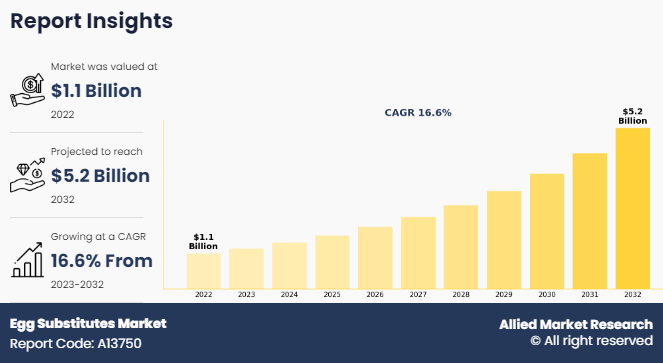
The increasing number of individuals adopting vegan and vegetarian lifestyles is a key factor driving the egg substitutes market growth. As people become more conscious of ethical, environmental, and health concerns associated with traditional animal farming, they seek plant-based alternatives, driving the demand for egg substitutes. Consumers are becoming more health-conscious and are seeking products that align with their dietary preferences and health goals. Egg substitutes often cater to individuals looking to reduce cholesterol intake, avoid allergens, or manage weight, contributing to the market growth. Moreover, concerns related to animal welfare and the environmental impact of traditional egg production are leading consumers to explore plant-based alternatives.
Egg substitutes offer a cruelty-free and environmentally sustainable option, appealing to those who prioritize ethical and eco-friendly choices. Advances in food technology have led to the development of innovative plant-based ingredients that closely mimic the functionalities of eggs in various culinary applications. These innovations enhance the overall quality and versatility of egg substitutes, attracting more consumers to choose plant-based alternatives. As consumers explore diverse cuisines and dietary options, the demand for egg substitutes rises, contributing to the growth of the market.
Achieving a taste that closely mimics real eggs is a complex task. Eggs contribute a unique flavor to dishes, and replicating this can be challenging for manufacturers of egg substitutes. Eggs play a crucial role in providing specific textures to various food products, such as cakes, cookies, and mayonnaise. Mimicking the texture of eggs in these applications can be difficult, as eggs contribute to the structure, moisture, and mouthfeel of the final product. Eggs serve various functions in cooking, including emulsification, binding, and leavening. Egg substitutes need to replicate these properties accurately to ensure similar cooking results. Achieving the right consistency and performance in different recipes can be a hurdle.
Consumers are often accustomed to the taste and texture of traditional eggs. Any noticeable deviation in these attributes may lead to skepticism and reluctance to adopt egg substitutes. Overcoming preconceived notions and winning consumer trust is crucial for market acceptance. These challenges requires ongoing innovation, collaboration between the food industry and researchers, and a deep understanding of consumer preferences. Manufacturers need to strive to create egg substitutes that not only match the sensory attributes of real eggs but also offer additional benefits such as nutritional enhancements and sustainability.
The advanced technologies in ingredient innovation allow for the creation of healthier egg substitutes that meet specific dietary requirements. This includes the development of substitutes with lower cholesterol, reduced fat content, and other nutritional enhancements, addressing health-conscious consumers' demands. Technological advancements enable the production of egg substitutes that are free from common allergens, such as soy, gluten, and dairy. This addresses the needs of consumers with allergies or intolerances and expands the market reach to a broader audience. Consumers are increasingly seeking clean label products with natural and recognizable ingredients.
Technological advancements help in formulating egg substitutes using natural and clean label ingredients, meeting the growing demand for transparency and simplicity in food products. Advancements in processing technologies can lead to more cost-effective production methods for egg substitutes. This could potentially result in more affordable products, making them accessible to a broader consumer base further driving market expansion. Technological advancements enable the development of egg substitutes with a focus on sustainability. This includes exploring plant-based and environmentally friendly options that resonate with consumers concerned about the ecological impact of food production.
The key players profiled in this report include Cargill Inc., DuPont Nutrition & Health, Kerry Group, Glambia Plc., Corbion Puratos, Danone Nutricia, Flordia Food Products LLC, FIberstar Inc., MGP Ingredients, and Arla Foods Ingredients. Product innovation and development of egg substitutes are common strategies followed by major market players. For instance, in July 2021, Japan-based food tech Next Meats expanded its alternative protein range with a new egg substitute named Next Egg 1.0. The 100% vegan egg alternative meets the needs of the vegan population and people with egg allergies.
The egg substitutes market is segmented on the basis of form, application, distribution channel, and region. By form, the market is classified into dry and liquid. By application, the market is classified into bakery & confectionery, savories, sauces, and dressings & spreads. By distribution channel, the market is classified into online stores, supermarkets & hypermarkets, convenience stores, and specialty stores. By region, the market is analyzed across North America, Europe, Asia-Pacific, and LAMEA.
The egg substitutes market is segmented into Form, Application and Distribution Channel.
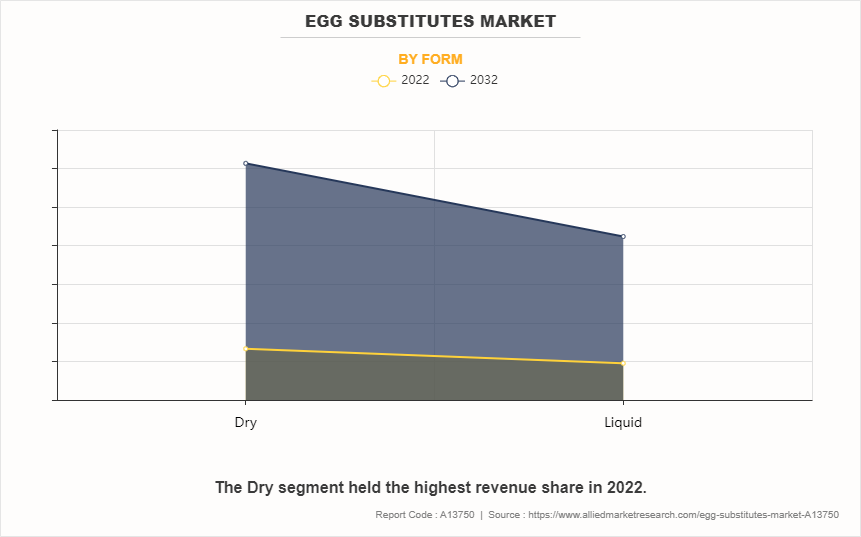
By form, the dry sub-segment dominated the global egg substitutes market share in 2022. Dry egg substitutes typically have a longer shelf life compared to their liquid counterparts. The dehydration process helps in preserving the product for an extended period, making it convenient for both consumers and manufacturers. The dry form of egg substitutes is convenient for storage and transportation. It requires less space and is not as perishable as liquid alternatives. This makes it an attractive option for consumers and food manufacturers looking for easy-to-handle products. Dry egg substitutes are versatile and can be used in a variety of recipes, including baking, cooking, and other food applications. This versatility contributes to their popularity among food manufacturers who are seeking flexible ingredients that can be easily incorporated into different products. Dry egg substitutes can be distributed globally more easily than liquid counterparts, as they are not as prone to spoilage during transportation. This makes them an attractive option for companies looking to supply egg substitutes to diverse markets.
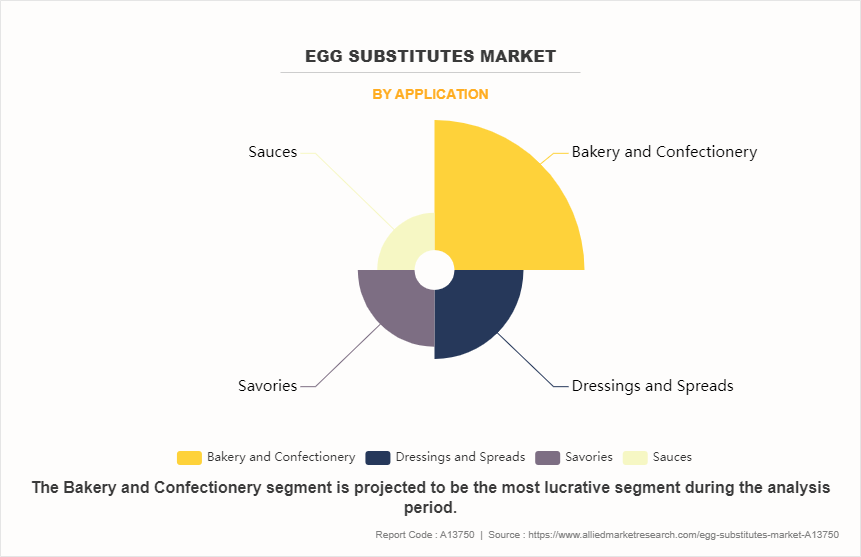
By application, the bakery & confectionery sub-segment dominated the global egg substitutes market share in 2022. The increasing number of people adopting vegan and vegetarian lifestyles has led to a growing demand for egg substitutes in bakery and confectionery products. Egg substitutes serve as suitable alternatives for those who avoid animal products. Egg substitutes are often chosen by individuals with allergies to eggs or those concerned about cholesterol levels. The use of egg substitutes allows manufacturers to cater to consumers with specific dietary restrictions or health preferences. Consumers are increasingly seeking products with clean and simple labels, free from artificial additives and preservatives. Egg substitutes that are perceived as natural and clean contribute to the appeal of bakery and confectionery products. Concerns related to animal welfare and environmental sustainability have driven consumers to opt for plant-based alternatives, including egg substitutes. Products that align with ethical and environmental values are gaining popularity in the market.
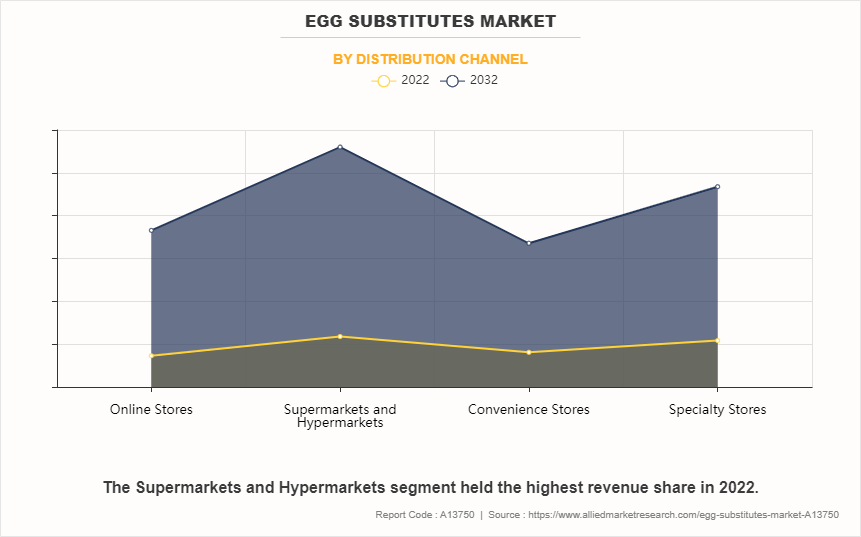
By distribution channel, the supermarkets & hypermarkets sub-segment dominated the global egg substitutes market share in 2022. The rising adoption of vegetarian and vegan lifestyles has led to an increase in demand for egg substitutes. Supermarkets and hypermarkets cater to diverse customer preferences, and egg substitutes play a crucial role in providing plant-based alternatives for these consumers. Growing awareness regarding health & wellness is driving consumers to seek alternatives to traditional eggs. Egg substitutes, often perceived as healthier options due to lower cholesterol and fat content, align with the increasing trend of health-conscious eating. Egg allergies are relatively common, and many individuals are seeking allergen-free food options. Egg substitutes offer a suitable solution for those with egg allergies, contributing to the overall growth of this market segment in supermarkets and hypermarkets. The COVID-19 pandemic has highlighted the importance of resilient and diverse supply chains. The egg substitutes market, being less susceptible to disruptions compared to traditional egg production, may see increased adoption in supermarkets and hypermarkets as retailers aim to ensure a steady supply of products.
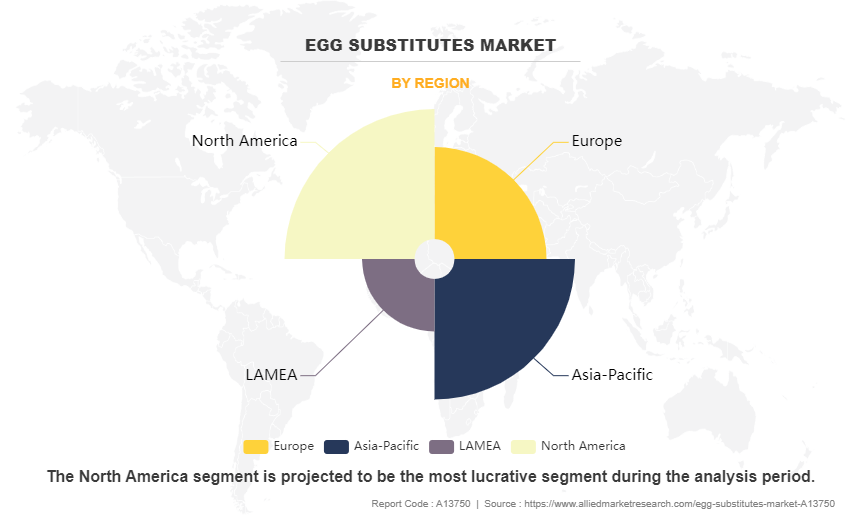
By region, North America dominated the global egg substitutes market in 2022. Consumers in North America have been showing a growing interest in healthier food options. Egg substitutes, particularly those made from plant-based sources, appeal to individuals looking to reduce cholesterol intake and adopt a healthier lifestyle. The popularity of vegan and vegetarian diets has been on the rise, driven by ethical, environmental, and health considerations. Egg substitutes made from plant-based ingredients cater to this growing market. Egg allergies are common, and many consumers are seeking allergen-free alternatives. Egg substitutes provide a solution for individuals with egg allergies, allowing them to enjoy a variety of dishes without compromising on taste or texture. Due to increasing awareness regarding the environmental impact of food choices, consumers are looking for sustainable options. Plant-based egg substitutes, such as those made from soy, almond, or pea protein, are often perceived as more environmentally friendly compared to traditional egg production. The regional egg substitutes market has witnessed increased availability and distribution. As more products become readily accessible in supermarkets, health food stores, and online platforms, consumer adoption is likely to grow.
Key Benefits For Stakeholders
- This report provides a quantitative analysis of the market segments, current trends, estimations, and dynamics of the egg substitutes market analysis from 2022 to 2032 to identify the prevailing egg substitutes market opportunities.
- The egg substitutes market forecast research is offered along with information related to key drivers, restraints, and opportunities.
- Porter's five forces analysis highlights the potency of buyers and suppliers to enable stakeholders make profit-oriented business decisions and strengthen their supplier-buyer network.
- In-depth analysis of the egg substitutes market segmentation assists to determine the prevailing market opportunities.
- Major countries in each region are mapped according to their revenue contribution to the global egg substitutes market size.
- Market player positioning facilitates benchmarking and provides a clear understanding of the present position of the egg substitutes industry players.
- The report includes the analysis of the regional as well as global egg substitutes market trends, vegg, key players, market segments, application areas, and market growth strategies.
Egg Substitutes Market Report Highlights
| Aspects | Details |
| Market Size By 2032 | USD 5.2 billion |
| Growth Rate | CAGR of 16.6% |
| Forecast period | 2022 - 2032 |
| Report Pages | 308 |
| By Form |
|
| By Application |
|
| By Distribution Channel |
|
| By Region |
|
| Key Market Players | Flordia Food Products LLC, Corbion Puratos, MGP INGREDIENTS, Arla Foods Ingredients Group P/S, Kerry Group, Danone Nutricia, Cargill Inc., Tate and Lyle and Ingredion Inc., DuPont Nutrition & Health, FIberstar Inc., Glambia Plc. |
The global egg substitutes market was valued at $1.1 billion in 2022, and is projected to reach $5.2 billion by 2032
The global Egg Substitutes market is projected to grow at a compound annual growth rate of 16.6% from 2023 to 2032 $5.2 billion by 2032
The key players profiled in the reports includes Corbion Puratos, Cargill Inc., Glambia Plc., DuPont Nutrition & Health, Kerry Group, Tate and Lyle and Ingredion Inc., Flordia Food Products LLC, Arla Foods Ingredients Group P/S, FIberstar Inc., MGP INGREDIENTS, Danone Nutricia
By region, North America dominated the global egg substitutes market in 2022
Increasing number of individuals adopting vegan & vegetarian lifestyles, Rising health consciousness and a focus on a healthier lifestyle
Loading Table Of Content...
Loading Research Methodology...



